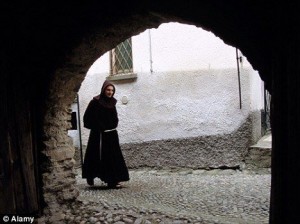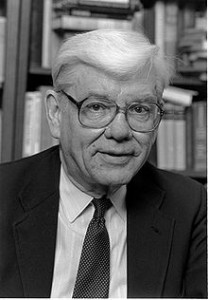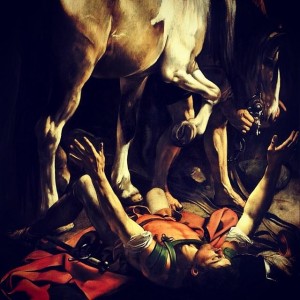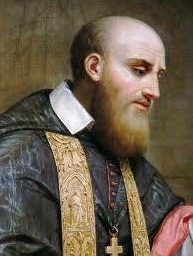 This is a rather unfortunate photograph of some Russian Orthodox bishops. While I am confident that they have no idea of the cultural critique, it is funny as hell.
This is a rather unfortunate photograph of some Russian Orthodox bishops. While I am confident that they have no idea of the cultural critique, it is funny as hell.
The first thing I thought of was “Here is ecclesiastical candy.”
 I laughed and laughed and laughed this morning when I read the story of a criminal serving his sentence with Capuchin friars pleading to be sent back to prison… because Capuchin life is too hard, he claimed! The reason for the humor is that Capuchins aren’t too known for their austerities today in North America; the Capuchin order may be strict only in a few places in the world but…may be this is a wake up call to the Friars Minor Capuchin (and others)…
I laughed and laughed and laughed this morning when I read the story of a criminal serving his sentence with Capuchin friars pleading to be sent back to prison… because Capuchin life is too hard, he claimed! The reason for the humor is that Capuchins aren’t too known for their austerities today in North America; the Capuchin order may be strict only in a few places in the world but…may be this is a wake up call to the Friars Minor Capuchin (and others)…
I got this story via a friend:
Austere existence: A convicted criminal serving out his sentence in a Sicilian monastery run by Capuchin monks has escaped for the second time and asked to be sent back to prison because life there was too tough .
Thief David Catalano, 31, was sent to a Santa Maria degli Angeli community run by Capuchin monks in Sicily last November.
But he found their austere lifetstyle too tough to handle and soon escaped. After a short while on the run he was caught by police and sent back.
On Monday he fled for the second time in six weeks, only to swiftly turn himself in at a police station and beg officers to send him back to jail in the nearby town of Nicosia.
He told the stunned policemen: ‘Prison is better than being at that hostel run by monks.’
A police spokesman said: ‘Catalano arrived out of the blue and said there was no way he could stay on with the monks.
‘He said it was too tough and he wanted to go back to prison, so we happily obliged and he is now back behind bars serving the rest of his sentence.
‘Life with the monks can be pretty tough – there are no mod cons and they are up early and go to bed early. There are no luxuries at the hostel and the monks run a very austere regime.’
The Santa Maria degli Angeli community is based in a monastery near Enna on the island of Sicily.
‘He said it was too tough and he wanted to go back to prison, so we happily obliged and he is now back behind bars’
It has been run as a halfway house by the Capuchin friars for more than 12 years with around 60 prisoners accommodated there as they near the end of their sentences.
Today, word was received that the Most Reverend Raffaello Martinelli, bishop of Frascati, opened the diocesan process for the cause of beatification for Chiara Lubich, foundress of the Opus Mariae (Work of Mary) – Focolare Movement. On 7 December 2013, the formal request was made by the current president of the Focolare Movement, Maria Voce, the direct successor to Chiara, to open the cause. The date of December 7th is significant because it was the 70th anniversary of the founding of the Movement. At the time of the formal request to Bishop Martinelli, Voce said: “This act invites us all to a life of greater holiness, lived day by day to contribute towards collective sanctity, that sanctity of the people so dear to Chiara’s heart.”
Chiara Lubich died on 14 March 2008. The officials of the Focolare Movement estimate that more than 120.000 have visited the sites where she lived and where her mortal remains rest.
The Movement has one their members beatified (Luce Badano) and 12 others who have their causes being studied.
 The idea of sharing anew the beautiful, the true and the good of the Catholic faith with baptized Catholics, with other Christians, and with those justing seeking Someone greater, is popular these days. The words we are using to describe this sharing of faith is the new evangelization. Saint John Paul got the ball rolling again after a hiatus from the time of Blessed Paul VI and the Fathers of the Second Vatican Council with promoting a new way of bring the Lord’s Good News to society again. But for him the new evangelization isn’t about a program as much as it is manner of conversion.
The idea of sharing anew the beautiful, the true and the good of the Catholic faith with baptized Catholics, with other Christians, and with those justing seeking Someone greater, is popular these days. The words we are using to describe this sharing of faith is the new evangelization. Saint John Paul got the ball rolling again after a hiatus from the time of Blessed Paul VI and the Fathers of the Second Vatican Council with promoting a new way of bring the Lord’s Good News to society again. But for him the new evangelization isn’t about a program as much as it is manner of conversion.
As typical, we see the use of the word “evangelization” used in a variety of ways but without a distinct and concrete definition. In my estimation few have really grasped the concept of it means to be engaged in evangelization. So many want to bolster the numbers of people in the pews, or get parish programs going or some such thing superficial thing. The difficult task is forming in a new way invested Catholics. There are times you get the sense that the “same-old” is being repackaged: it is new wine in old wine skins. The new evangelization becomes in many places more of the ghetto mentality and a perpetuation of an immature Christianity. That’s a long way of saying that we need a more creative approach in sharing the faith in bold ways.
Certainly we don’t need gimmicks. We do, however, need an honest approach that is human connected to the divine.
The Benedictine monks are getting to the heart of what I am aiming at with the new evangelization: beer brewing for the Kingdom of God. Indeed, the brewing of beer (and drinking the beer) can be a de-regulated way of getting to the heart of the faith, getting to the creator and how He is manifested in His creation. Brewing and drinking beer is a very human experience that will penetrate the heart and mind to think a little more deeply about spiritual things and how to live for and with Christ.
Here is an article, “Brew Evangelization.” Read this fine article and the links embedded. One of my interests is to see the Benedictine charism flower again. AND it is beginning to do just that….
 The question was asked: Who was Jaroslav Pelikan, and why does his work remain so important for serious Christian scholarship today?
The question was asked: Who was Jaroslav Pelikan, and why does his work remain so important for serious Christian scholarship today?
First Things published this essay of Timothy George, “The Legacy of Jaroslav Pelikan”: http://www.firstthings.com/web-exclusives/2015/01/jesus-on-safari
Pelikan was a seminal and inviting thinker. He did his work as a ministry and not merely making his academic career and name known. Faith and reason had a great proponent in JP. Thanks to Timothy George for a fine essay!
Dr George writes: “Jaroslav Pelikan had a love for all things human and humane, and his work still enrichs every person who looks at the world with intellectual curiosity and moral imagination. But his legacy shines especially bright among those who follow Jesus Christ, belong to his church, and see the world through the eyes of the Savior’s love.”
I seem to have been a drawn to what Jaroslav Pelikan did for the Christian faith, particularly my Catholic faith. On a personal note, Dr Pelikan is buried here in New Haven at the famed Grove Street Cemetery. Periodically, I pass by his grave to pray for him. May God grant him mercy!
From e hymn for evening Vespers for the holy founders of Citeaux:
“Bold leader of this vast array, Saint Robert, intercede today. God grant us hearts to dream anew, and strength his kingdom to pursue.
Fond lover of that hallowed place, where brothers lived as one by grace, Saint Alberic, pray we may be one heart, one mind, in unity.
Impassioned master in Christ’s school, Saint Stephen, zealot for our rule, bid God we never build on sand, but firm in faith, on rock we stand.”
You may be aware that these saints are not honored on the Roman liturgical calendar, but revered by the monks and nuns of the Cistercian and Benedictine monasteries, are the three holy founders of Citeaux (near Dijon, France): Saints Robert Molesme (centered in the image), Stephen Harding and Alberic. They began their reform of Benedictine life in 1098. The Cistercian movement is now venerable but when it was started it was very contentious as you might expect –anytime you ask people to change you run against the tide. Think of the Prophets, or in particular, the Prophet Jonah of yesterday’s reading at Mass. Let us pray for our own conversion, and that of the Church. But also for God’s abundant grace to fall on those who have made profession to the charism of Citeaux –monks, nuns, and the laity.
The early Cistercians, impelled by a burning thirst for authenticity, wished to interpret the Rule (of St. Benedict) in the light of its monastic background and to recover its original simplicity. Their life was marked by a real detachment from the world, a love of solitude and silence, poverty and simplicity, austerity and manual labor, prayer and holy reading, all within a cenobitic framework which laid great stress upon the value of fraternal charity in the common life.
There is an attractive genuinity about this reform, which was not merely an archeologizing return to the past, but a recapturing of the primitive monastic ideal and an attempt, largely successful, to express it in structures suitable to the times.
The school of spirituality which the white monks produced, dominated by St. Bernard, is no less notable for its charming huamanity than for its authentically contemplative orientation.
Monastic Spirituality
Claude Peifer, O.S.B.
The document Unitatis Redintegratio (21 Nov. 1964) of the Second Vatican Council stresses spiritual ecumenism. Sometimes we overlook this aspect. But we can’t but focus on what is the soul of the ecumenical movement; theologians and church leaders have a lot of work to do on this point; I recall that the saints have kept their eyes on this method, and so we as members of the Body of Christ have to keep focused on daily conversion, a daily turn toward the Lord.
With two noteworthy ecumenical monastic communities this week, Taize and Bose, the Pope spoke of three conditions at the center for Christian unity:
1. there’s no unity without conversion of heart, which includes forgiving and asking for forgiveness.
2. there is no unity without prayer and therefore men and women religious who pray for unity are like ‘an invisible monastery’ bringing together Christians of different denominations from different countries around the world.
3. there is no unity without holiness of daily life. so the more we put our search for unity into practise in our relations with others, the more we will be modelling our lives on the message of the Gospel.
The Week of Prayer for Christian Unity which concludes today (the feast of the Conversion of St Paul) meditated on the theme, “Give me a drink,” from the narrative of the Samaritan woman meeting Jesus.
In his talk with the monastic communities whose primary work is Christian Unity, His Holiness spoke of the fact that we see in the Savior a “desire for unity” among the disciples, and that same thirst continues today especially with the divisions of the Christian community. The thirst of the Samaritan woman –and therefore each one of us– is a “thirst not only material for water, but above all our thirst for a full life, free from the slavery of evil and death.”
Francis calls us to pray about this fact: “Jesus is the fulfillment of God’s promises because it is he who gives to the Holy Spirit, the ‘living water’ that quenches our restless hearts, hungry for life, love, freedom, peace: thirsty for God.”
 O glorious St. Paul, who from a persecutor of Christianity, didst become a most ardent apostle of zeal; and who, to make known the Savior Jesus Christ unto the ends of the world, didst suffer with joy imprisonment, scourging, stoning, ship-wrecks and persecutions of every kind, and in the end didst shed thy blood to the last drop, obtain for us the grace to receive, as favors of the Divine Mercy, infirmities, tribulations, and misfortunes of the present life, so that the vicissitudes of this our exile will not render us cold in the service of God, but will render us always more faithful and more fervent. Amen.
O glorious St. Paul, who from a persecutor of Christianity, didst become a most ardent apostle of zeal; and who, to make known the Savior Jesus Christ unto the ends of the world, didst suffer with joy imprisonment, scourging, stoning, ship-wrecks and persecutions of every kind, and in the end didst shed thy blood to the last drop, obtain for us the grace to receive, as favors of the Divine Mercy, infirmities, tribulations, and misfortunes of the present life, so that the vicissitudes of this our exile will not render us cold in the service of God, but will render us always more faithful and more fervent. Amen.
The 25th of January this year is a Sunday so the feast is not commemorated in the NO Liturgy but a clued-in preacher will be able to link the Scripture readings with Paul’s move from persecutor to Apostle of Jesus Christ. The missionary impulse of the Church needs to follow the paradigm we find in Paul: meet the Lord first, know and love the Lord, and then share call to holiness to all nations.
 Thanks to Mark de Vries who made translation of a recent interview with Archbishop Georg Gänswein by Christ & Welt (a German publication and made it available on his blog, In Caelo et in Terra.
Thanks to Mark de Vries who made translation of a recent interview with Archbishop Georg Gänswein by Christ & Welt (a German publication and made it available on his blog, In Caelo et in Terra.
The interview, “From the Front Row” is indeed an interesting for its frank discussion of Pope Francis petrine ministry and several matters like the Roman Curia, the pope emeritus, the recent Synod and the like.
The Archbishop is 58, a native of Germany, and the prefect of the Papal Household and secretary to Benedict XVI. He was ordained a bishop on 6 January 2013.
 “Ask for nothing, refuse nothing,” Saint Francis de Sales, 1567-1622.
“Ask for nothing, refuse nothing,” Saint Francis de Sales, 1567-1622.
Saint Francis de Sales, tireless teacher, bishop and Doctor of the Church, pray for us!
Why not read some of his classic texts:
– “Introduction to the Devout Life” –> http://ow.ly/HS4vq
– “Treatise on the Love of God” –> http://ow.ly/HS4zQ
– “The Catholic Controversy” –> http://ow.ly/HS4Cb
A blessed feast day to all Visitation Sisters and all members of the extended Salesian family!